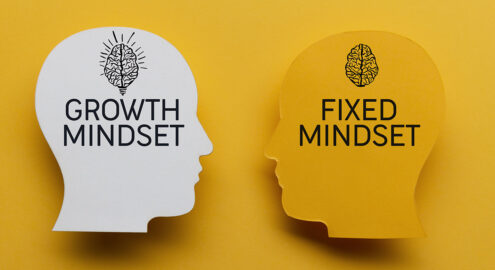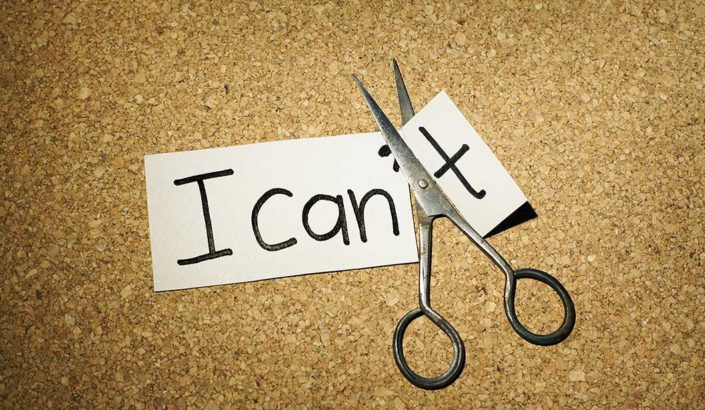What Is It?
To have a growth mindset about a particular personal quality or ability—such as personality, intelligence, or happiness—is to believe that the attribute is malleable, that it can change and develop through effort and practice. In contrast, a fixed mindset is the belief that the quality in question is set at a certain level and cannot be altered.
Carol Dweck, the leading researcher on growth mindset, has found that students, some as young as preschool age, with a fixed mindset are less likely to challenge themselves and are more helpless in the face of mistakes. Rather than striving to grow, they want to demonstrate how smart they are, and fear that failure will “reveal” a lower level of (unchangeable) smartness.
A fourth grader with a “fixed mindset” struggles with fractions and claims, “I just can’t do math.” As a result, he barely studies for tests, gives up on homework easily, and sees his math grade decline, confirming his belief.
In contrast, students with a growth mindset are more resilient. They tend to see mistakes as a chance to grow and seek out challenges as a way to build their brain power. Overall, the good news is that studies have demonstrated that growth mindset can be taught.
A high school language arts teacher has helped her students develop their “growth mindset” around their ability to write by offering them multiple chances to revise their writing assignments before they receive a final grade. As a result, students’ writing not only improves, but their attitude towards their teacher’s feedback changes for the better. They now pay more attention to her comments, knowing that her suggestions will make them better writers.
Initial research on growth mindset focused mainly on beliefs about intelligence, but has since expanded to look at other personal qualities, such as personality, emotional experience, and moral character. As with intelligence, believing that these attributes can change tends to be associated with greater psychological well-being.
A teenager who tends to view people’s behaviors with a growth mindset responds to his friend’s unkind words with compassion rather than contempt, asking his friend if something has happened to upset him.
As the idea of growth mindset has become more widespread, especially in education, Dweck and others have cautioned against an oversimplified reliance on sheer effort as a panacea; the type of effort, such as strategies used, matters, of course, as do unrealistic expectations of oneself or others, which can lead to judgment and disappointment.
Still, believing that personal qualities even have the potential to change is a critical first step towards improvement.
Why Is It Important?
Much of the research on growth mindset, especially in children and youth, deals with beliefs about intelligence, and shows that students with growth mindsets of intelligence tend to perform better academically (although effects may vary for different subgroups of students). But emerging research suggests the potential of cultivating social and emotional growth mindsets, as well, to increase well-being.
Growth mindsets can make us happier.
- People with growth mindsets about emotion regulate their feelings more effectively and experience more positive emotions.
- People who see levels of happiness or well-being as malleable tend to experience more of both.
Growth mindsets can boost social competence.
- Believing that personality is not fixed leads adolescents to show less vengeful aggression and more prosocial responses to social challenges, and can help young people overcome shyness.
- People with growth mindsets are also more likely to accept responsibility for their mistakes and less likely to engage in relationship violence.
Growth mindsets can reduce bias.
- Having a growth mindset about other people makes children less likely to stereotype and adults more willing to compromise for peace.
- People who see prejudice as changeable (vs. those who see it as a fixed trait) are more interested in and comfortable with cross-group interaction.
Growth mindsets can promote prosocial (kind and helpful) behavior.
- In studies with students from elementary school through college, those students who believe that personality, empathy, and morality can grow and change are more likely to make an effort to be empathetic and volunteer to help others.
Practices

Moving Forward with Hope

A Hopeful Plan

A Hopeful Legacy

Mindshifts: An Intellectual Humility Reflection Tool

Become an Admitter

Exploring Intellectual Humility through Astronomical Discoveries

People Can Change: Recognizing Our Potential for Growth

Four 4s

Number Talk

Dot Card Number Talk

Mindset Boosting Messages for Math

Developing a Growth Mindset About Bullies and Victims

Developing a Growth Mindset About People’s Ability to Change

Giving Wise Feedback

Flipping Complaints Into Gratitude

Do you want to dive deeper into the science behind our GGIE practices? Enroll in one of our online courses for educators!


